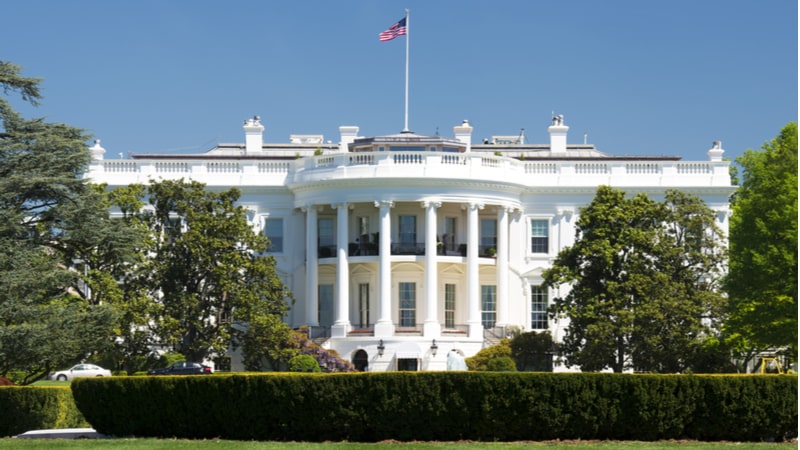
The White House’s budget proposal for fiscal year 2026 unveiled today is lining up the Cybersecurity and Infrastructure Security Agency (CISA) for a budget hit totaling $491 million and claiming that the cybersecurity arm of the Department of Homeland Security (DHS) is too focused on censorship that targeted President Donald Trump.
The topline budget proposal includes a whopping 65 percent increase in discretionary funds for DHS while cutting around 17 percent of CISA’s nearly $3 billion budget. Most of the proposed increased funding for DHS is aimed at ramping up President Trump’s deportation efforts and bolstering border security.
Last fiscal year’s budget proposal from the Biden administration featured a $103 million increase CISA.
The 46-page budget request offers no details on what CISA programs or offices would be reduced.
“The Budget refocuses CISA on its core mission – Federal network defense and enhancing the security and resilience of critical infrastructure – while eliminating weaponization and waste,” reads the document released today. It adds that the topline figure for CISA also remove duplicative offices and programs that exist at the state and Federal levels in addition to “redundant security advisors.”
The White House also said that the proposed budget cut would eliminate programs “focused on so-called misinformation and propaganda” and external international affairs engagement offices.
While CISA doesn’t have any offices specifically focused on combating misinformation and propaganda, it traditionally has been responsible for supporting state and local election security systems. In March, the Trump administration halted election security activities and cut funding for a system overseen by the agency that alerted states and local election offices of security threats.
CISA also became entangled in controversy when its former director Chris Krebs became Trump’s target and was fired after Krebs said the 2020 presidential election was conducted securely and without significant voter fraud.
“The Budget eliminates CISA’s disinformation offices and programs that functioned as a hub in the Censorship Industrial Complex, conspiring against the First Amendment rights of President Trump and his supporters,” the White House said.
“CISA was more focused on censorship than on protecting the Nation’s critical systems, and put them at risk due to poor management and inefficiency, as well as a focus on self-promotion,” the budget document adds.
Claims of CISA being “far off [its] mission” have been common among Trump administration officials, with DHS Secretary Kristi Noem saying during her confirmation hearing that the agency has been trying to counter online foreign disinformation campaigns that are outside the scope of its core mission. She had also advocated for significant cuts to the agency, claiming that it needed to be “more effective, smaller, more nimble.”
However, recent cuts at CISA have raised bipartisan concern among lawmakers. Rep. Andrew Garbarino, R-N.Y., chair of the House Homeland Security Subcommittee on Cybersecurity and Infrastructure Protection, said that he hasn’t been “thrilled” with workforce cuts while Democrats have expressed concern about the agency’s capacity to fight cybersecurity threats.
Other Notable Agency Wins, Losses
The proposed budget also features notable cuts to agencies, including the Department of Health and Human Services (HHS) and the National Science Foundation (NSF). The request includes a 26 percent cut to HHS funding and a 56 percent cut to NSF funding.
The Department of Transportation would get a boost for Federal Aviation Administration (FAA) operations, with the budget requesting an increased amount of $13.8 billion.
“This funding level would support the administration’s air traffic controller hiring surge and salary increases, which are critical to addressing the air traffic controller shortage, as well as FAA’s ongoing updates to its outdated telecommunications systems,” the budget request says.
The budget also features a boost for the Department of Commerce, including $134 million in targeted investments to strengthen trade enforcement and “aggressively protect American innovation.” This includes an additional $122 million for the Bureau of Industry and Security – a more than 50 percent increase – “to protect the nation’s technological competitiveness and counter threats from China.”
Also notable is a proposed $325 million cut from enacted 2025 levels to the National Institute of Standards and Technology (NIST), which the White House claims is due to funding awards “for the development of curricula that advance a radical climate agenda.”
NASA would receive 24 percent funding cut, but its human space exploration programs are in line for a $647 million boost from 2025 enacted levels.
“By allocating over $7 billion for lunar exploration and introducing $1 billion in new investments for Mars-focused programs, the budget ensures that America’s human space exploration efforts remain unparalleled, innovative, and efficient,” the budget proposal says.
